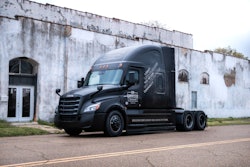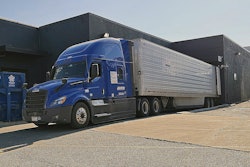CCJ Innovators profiles carriers and fleets that have found innovative ways to overcome trucking’s challenges. If you know a carrier that has displayed innovation, contact CCJ Chief Editor Jason Cannon at [email protected] or 800-633-5953.
Polaris Transportation Group wanted to reduce the amount of manual labor and paperwork associated with moving freight. The Canadian cross-border and domestic TL and LTL carrier launched its NorthStar Digital Solutions lab in 2019 to achieve that goal, and it has given the carrier a massive return on investment that keeps on giving.
The lab works with artificial intelligence and machine learning to find more efficiencies in the company’s processes.
The team started with robotics process automation (RPA), which uses software bots to automate repetitive tasks, for customs document processing and workflows. Now the RPA handles about 80% of those processes without human touch, allowing the company to downsize from a team of 30 to 40 people to three to four in exception management. That project opened the floodgates, and now the team leverages RPA to cut down order entry time, which has gone from a 20- to 30-minute process to now less than four minutes.
The company now has in excess of 300 bots managing workflow in different areas.
Now, Polaris is taking things a step further, layering artificial intelligence on top of the RPA to go beyond rules-based automation to decision-making agents. The company uses RPA for its dynamic pricing engine, which optimizes loads based on capacity and other factors. The company is building a quantum rating engine with the addition of AI that will enhance its dynamic pricing.
“What we're changing with the quantum rating engine is going to be much more dynamic. It's going to look at many more variables that today a human would have to look at to manage it,” said Dave Brajkovich, chief technology officer at Polaris and chief operating officer of NorthStar Digital Solutions.
Brajkovich said Polaris receives anywhere from 3,000 to 5,000 quote requests a day.
“You cannot manage that with a team of six people, even if you had an army of 30 people,” he said. “If we had to take every channel of those quotes and then basically put a time on it of how a human needs to interact with a customer, you'd lose a whole day, and you couldn't get past maybe 10% or 15% of those volumes.”
Right now, the RPA bots can give insight, but it doesn’t have any decision-making capability. That’s the goal.
Brajkovich said instead of a rating person managing this through tables, the quantum rating engine will decide and orchestrate rate deals within seconds based on data like history with the customer, origin and destination, pallet size and weight, whether special equipment is needed, weather information and more.
“I find that LTL pricing is kind of like the stock market. It fluctuates with everything: fuel surcharges, the economy, political landscape, sustainable landscapes – all of that factors in. So one day, you may have a price of $250 to move a pallet from Point A to Point B, and then you come tomorrow, and because the landscape has changed, it's now $300,” he said. “That's where we're seeing that this technology can add value. The amount of volume that we deal with, a human being can't handle all that in one day, so that's why we're trying to promote the technology to try to help us get through those cycles faster and more accurately.”
By combining data from its transportation management system at the core with the intelligence of its people, the company is compiling a smart quantum rating engine that can drive proper results back to its customers and its internal management of workflow prioritizations, while also gleaning from the data previously unknown insights.
Brakovich said NorthStar is approaching this through modern tools, including agentic and cognitive AI, blended with large language models like ChatGPT, to bring back prominent reporting factors to the team members who will handle the customer interactions that develop from the rating engine. Polaris already has an AI framework for business intelligence that operates a large language model based on the company’s own data, which it will now layer AI processors over to bring back data a user asks for.
“Currently, we have automated systems that interact with clients, but it's very basic. It does some of the work, but it doesn't do all the work. We're going back to the drawing board and utilizing what we already know and what we already have, and we're going to take that to the next level,” he said. “People that don't play in the sandbox every day but rule it, or at least are authorized rulers in that sandbox, can actually make sure the sand is clean and that the people are playing well in the sandbox and that everything is working as it should,” rather than actually having to make the decisions.
NorthStar is starting with a minimal viable product, and Brajkovich said he expects to have a proof of concept or pilot running within the next six months. He said the full product could take months to years because what they’re building is complex and unique.
The CCJ Innovators program is sponsored by Comdata, ExxonMobil, Fleetworthy and Mack Trucks.










